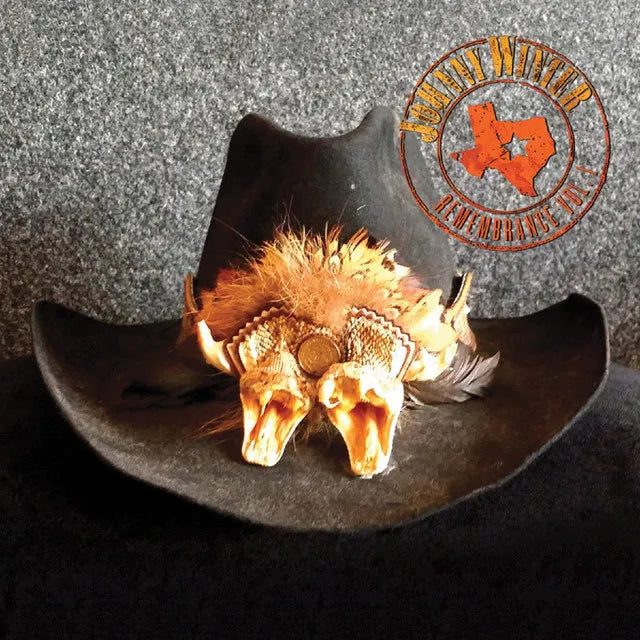Johnny Winter Biography
Who is Johnny Winter? A Brief Career Overview
Born John Dawson Winter III on February 23, 1944, in Beaumont, Texas, Johnny Winter was an electrifying guitarist, singer, songwriter, and producer who left an indelible mark on the blues and rock genres. Often hailed as one of the finest slide guitarists in music history, Winter's unique blend of electric blues, blues rock, and classic rock captivated audiences from the late 1960s through the early 2000s. His high-energy performances and deep, soulful voice resonated across the globe, earning him a dedicated following and a place in music history. Furthermore, Winter's collaboration with the legendary Muddy Waters, producing Grammy Award-winning albums, showcased his versatility and passion for authentic blues music. With a discography that includes numerous vinyl releases, Johnny Winter not only contributed to the enrichment of blues music but also became an iconic figure in vinyl culture, celebrated by collectors and fans alike.
Johnny Winter's Early Life and Background
Johnny Winter's journey into the world of music began in a household where creativity thrived. Coming from a family deeply rooted in musical pursuits, Winter and his brother Edgar were introduced to instruments and performance early on, despite both being born with albinism. Their father, a saxophonist and guitarist, often filled their home with sounds that would inspire their ambitions. By the age of ten, Johnny had shown talent by performing on a local children's television show, and he soon took up guitar. His exposure to local blues legends like Muddy Waters and B.B. King, along with his early band performances, crystallized his desire to make music a lifelong career. These foundational experiences would later fuel his passion for vinyl records, adding vibrant hues to his musical palette and collection.
The Musical Influences That Shaped Johnny Winter's Sound
Throughout his career, Johnny Winter's sound was notably shaped by a diverse array of musical influences. Artists like B.B. King, Muddy Waters, and Chuck Berry played pivotal roles in inspiring Johnny's energetic guitar work and emotive vocal style. Winter's fascination with the blues was evident in his commitment to preserving and innovating upon the genre. The slide guitar techniques he learned from his idols influenced his musicality and performance style, earning him a place as one of the greats alongside early legends. As a vinyl collector, Winter admired records that captured these classic sounds and often credited them as essential references in his development. It was in these early vinyl grooves that he discovered the emotional depth of the blues, which would inform his songwriting and performance throughout his life.
How Johnny Winter Entered the Music Industry
Johnny Winter's entrance into the music industry was more than just a calling; it was a reflection of his passion and determination. It all started at the young age of 15 when he formed his band, Johnny and the Jammers, which led to local success. His first single, "School Day Blues," marked the beginning of a trajectory that would take him to legendary stages. The pivotal moment came in 1968 when Winter's performance at the Fillmore East captured the attention of record executives, leading to a groundbreaking deal with CBS Records--reportedly the largest advance for a solo artist at that time. Early recordings, such as his debut vinyl, "Johnny Winter," established his raw talent and paved the way for further experimentation and collaboration. During this era, Winter not only honed his distinct sound but also built a solid foundation based on the vibrant culture of vinyl releases, which became a crucial part of his artistic identity.
Johnny Winter's Breakthrough and Rise to Fame
Winter's rise to fame reached new heights with his self-titled debut album, "Johnny Winter," released in 1969. The record quickly climbed the charts, showcasing his slide guitar mastery and gaining critical acclaim for tracks like "Dallas" and "Be Careful with a Fool." His performance at the iconic Woodstock festival solidified his status as a dynamic live performer, introducing him to an expansive audience. Further success followed with his second album, "Second Winter," highlighting his innovative track arrangements--even featuring a unique blank fourth side. The public's embrace of his passionate performances and exceptional musicianship propelled Winter into the limelight, where he enjoyed a successful career filled with international tours and numerous vinyl releases that delighted collectors and fans alike.
How Personal Life Shaped Johnny Winter's Music
Johnny Winter's personal life was interwoven with his music, culminating in a rich tapestry of experiences that influenced his artistic expression. His struggles with addiction, particularly during the height of his career, profoundly affected his songwriting and performances. However, it was his resilience that allowed him to emerge from these challenges with renewed vigor, as captured in his comeback album, "Still Alive and Well." The heartfelt lyrics and bluesy themes reflect his personal battles, particularly with loss and redemption, resonating deeply with listeners. His wife, Susan Warford, was a source of support throughout many trials, and her influence is felt in several heartfelt songs. Additionally, Winter's philanthropic work and advocacy for the blues helped shape his public image, as he used music as a platform for social issues, leaving a lasting impact in both the community and the industry.






![Live Bootleg Series Volume Two [Original Recording Remastered]](https://cdn.shopify.com/s/files/1/0069/3465/9162/files/Johnny-Winter-Live-Bootleg-Series-Volume-Two-_Original-Recording-Remastered_-vinyl-241016-1754.webp)































